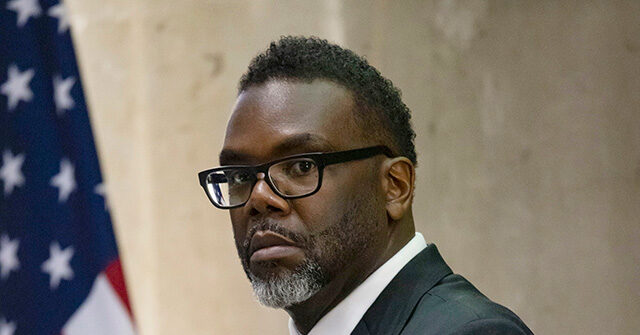Top News
Chicago Mayor Cancels Public Gallery in City Council Chambers After Public Protests of His Sanctuary City Policies

The self-professed “progressive” Mayor of Chicago Brandon Johnson is taking heat for the “antidemocratic” move of shutting down the public gallery in the city council chambers after weeks of citizens filling the gallery and vociferously protesting his sanctuary city policies.
The mayor has canceled the open-door policy for the second-floor gallery where citizens once could take a seat to watch the proceedings of the council as it debates issues, sets policies, and works to pass statutes.
In the past, the gallery was open to the public on a first-come, first-serve basis. But now, the mayor has changed the rules with a new policy where gallery seats are doled out only to those who have asked an alderman for permission to attend a session.
The change in the gallery seating policy comes after months of sometimes disruptive behavior from citizens who came to watch over the city council’s business, and in almost every case recently, the spark for that disruption was the mayor’s migrant spending plans.
Citizens will be allowed to sit in the third-floor gallery, but this small viewing platform is high above the chambers and is also behind glass where any catcalls or comments will go unheard by the council members and the mayor down below.
The change is sudden enough that city hall’s written rules still say, “The public is admitted to the Gallery’s non-reserved seats on a first-come, first-served basis,” a policy that used to apply to both the second and third-floor balconies.
But as of this week, citizens have been directed only to the third floor and have been told that the second floor is for reserved seating only.
Migrants line up as they wait for a bus to Chicago to transport them out of Eagle Pass, Texas, on September 26, 2023, at the Mission Border Hope complex. (ANDREW CABALLERO-REYNOLDS/AFP via Getty Images)
A story by WBEZ, the outlet that broke the news, says the new gallery plan “has not been published publicly” but “will remain indefinitely.”
The new policy set Chicago’s Better Government Association (BGA) on edge.
The BGA railed about the sudden and unannounced change in the gallery policy and insisted that “Personal relationships with elected officials should not be a determining factor in the public’s access to public meetings. Any new rules or restrictions should be applied equally to all attendees, with no carve-outs for aldermanic or mayoral invitations.”
The BGA went on to torch Johnson who came to office claiming that he would have the “most transparent” city hall ever:
Despite pledges of greater transparency during his campaign and a “City Hall Open House” photo-op at his inauguration, Mayor Johnson has more significantly restricted access to the upper floors of City Hall – including aldermanic and mayoral office suites as well as the council chambers – than any of his predecessors. The public is not even allowed access to the stairs or elevators until shortly before public meetings, and the new, unpublished seating rules banish most attendees to the upper balcony, which offers more limited viewing and hearing, as well as suffering from overcrowding and overheating.
The Chicago Tribune equally excoriated this “transparent” mayor in an editorial on Thursday calling Johnson’s move “antidemocratic.”
The Tribune added:
Johnson is intent on pushing through a City Council dominated by progressives like him a host of policies that strike hard at business in Chicago. He also has taken controversial steps on addressing the migrant crisis, the source of much of the recent unruliness in the council chamber. And this from for a mayor who styles himself a game-changing politician of the people. If the mayor believes the public supports these policies, he shouldn’t be afraid to face some of what he clearly views as negative optics.
The paper also slammed Johnson for changing the policy with neither public notice nor public debate:
The substance of what has happened here isn’t the only thing disturbing about this move. A civic decision of this magnitude isn’t ordinarily communicated solely via a strikingly sycophantic story in an outlet the mayor perceives as friendly. The tactic just raises more questions about this administration’s competence in handling basic functions and its lack of an effective and transparent communications operation.
“City Council works for the people,” the Tribune concluded. “They have a right to watch in person.”
Follow Warner Todd Huston on Facebook at: facebook.com/Warner.Todd.Huston, or Truth Social @WarnerToddHuston
Read the full article here


















